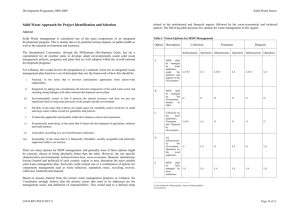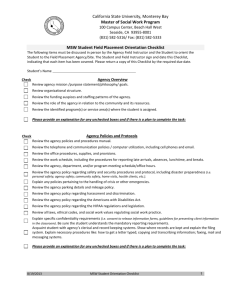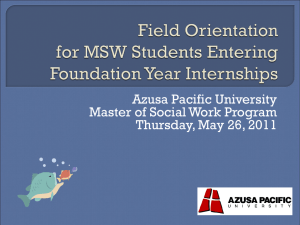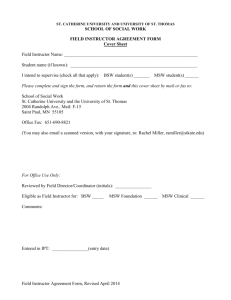Social Work - TCU: University Council
advertisement
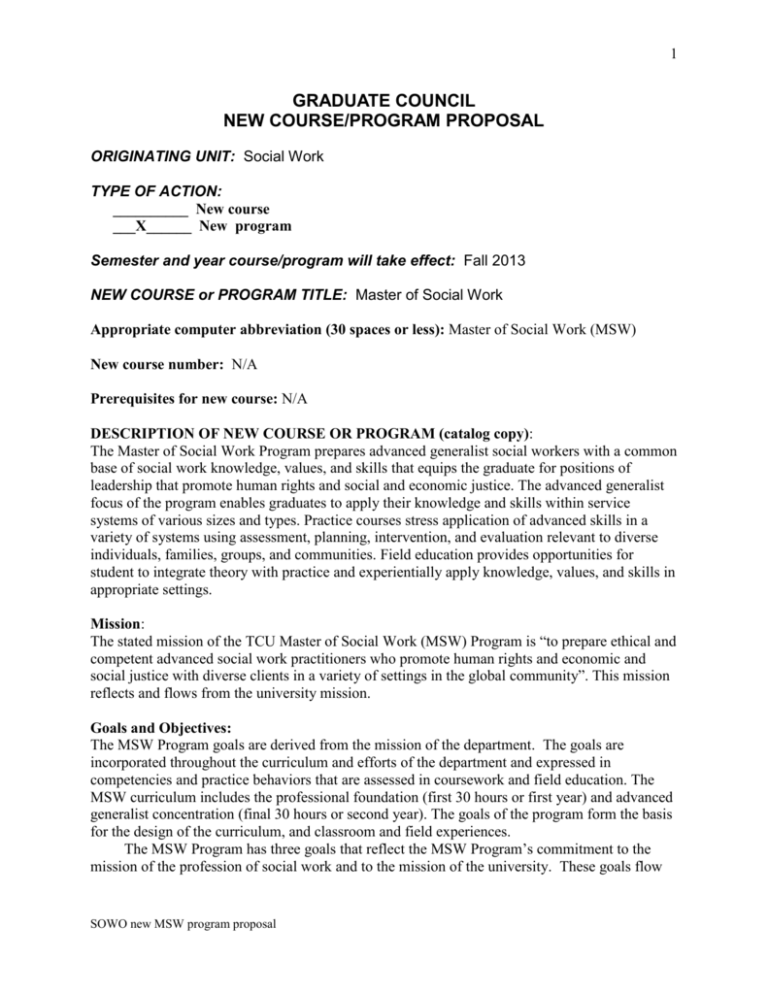
1 GRADUATE COUNCIL NEW COURSE/PROGRAM PROPOSAL ORIGINATING UNIT: Social Work TYPE OF ACTION: __________ New course ___X______ New program Semester and year course/program will take effect: Fall 2013 NEW COURSE or PROGRAM TITLE: Master of Social Work Appropriate computer abbreviation (30 spaces or less): Master of Social Work (MSW) New course number: N/A Prerequisites for new course: N/A DESCRIPTION OF NEW COURSE OR PROGRAM (catalog copy): The Master of Social Work Program prepares advanced generalist social workers with a common base of social work knowledge, values, and skills that equips the graduate for positions of leadership that promote human rights and social and economic justice. The advanced generalist focus of the program enables graduates to apply their knowledge and skills within service systems of various sizes and types. Practice courses stress application of advanced skills in a variety of systems using assessment, planning, intervention, and evaluation relevant to diverse individuals, families, groups, and communities. Field education provides opportunities for student to integrate theory with practice and experientially apply knowledge, values, and skills in appropriate settings. Mission: The stated mission of the TCU Master of Social Work (MSW) Program is “to prepare ethical and competent advanced social work practitioners who promote human rights and economic and social justice with diverse clients in a variety of settings in the global community”. This mission reflects and flows from the university mission. Goals and Objectives: The MSW Program goals are derived from the mission of the department. The goals are incorporated throughout the curriculum and efforts of the department and expressed in competencies and practice behaviors that are assessed in coursework and field education. The MSW curriculum includes the professional foundation (first 30 hours or first year) and advanced generalist concentration (final 30 hours or second year). The goals of the program form the basis for the design of the curriculum, and classroom and field experiences. The MSW Program has three goals that reflect the MSW Program’s commitment to the mission of the profession of social work and to the mission of the university. These goals flow SOWO new MSW program proposal 2 from the social work mission of preparing social work leaders to practice in the local and global community with an emphasis on human rights and social justice. The three goals are: 1. To prepare advanced practitioners to practice with an emphasis on human rights and social justice, in order to enhance the quality of life for all people 2. To prepare advanced practitioners to contribute to the social work profession through leadership, administration, and supervision 3. To prepare advanced practitioners with competence to address human needs both locally and globally In addition to our goals, the social work accrediting body, the Council on Social Work Education (CSWE), requires that the program identify their program competencies in order to meet accreditation standards. TCU must assure that our graduates have mastered the following 11 practice behaviors. 1. Identify as professional social workers and conduct themselves accordingly 2. Apply social work ethical principles to guide professional practice using the National Association of Social Workers Code of Ethics 3. Apply critical thinking to inform and communicate professional judgments 4. Engage diversity and difference in practice 5. Advance human rights and social and economic justice 6. Engage in research-informed practice and practice-informed research evaluating program outcomes and practice effectiveness at all levels 7. Apply knowledge of human behavior and the social environment including theories of human behavior and social systems 8. Engage in policy practice to advance social and economic well-being and to deliver effective generalist and advanced social work services 9. Respond to contexts that shape practice including emerging social needs, service delivery trends and social systems that comprise practice contexts 10. Engage, assess, intervene, and evaluate with individuals, families, groups, organizations, and communities at the generalist and advanced levels 11. Engage in advanced practice, supervision, and administration. With these goals and competencies in mind, the TCU MSW Program created a program of study to prepare students to have the knowledge, values, and skills required to move into advanced social work practice. The MSW Program incorporates the core competencies specific to the concentration of advanced generalist. The curriculum is developed in a structured manner building on the foundation content (first year) and moving into more advanced practice content (second year). Program of Study: The MSW curriculum is based on educational standards developed and implemented by the CSWE. The MSW requires approximately 60 hours of credit (a combination of 48 hours from coursework and 12 hours from internships). Full-time MSW students take 15 hours each semester and complete their degree in 2 years. Approximately 30 hours of graduate education credit can be obtained with the BSW degree, allowing students to enter with advanced standing. SOWO new MSW program proposal 3 Therefore, BSW graduates, like those from TCU, could complete their MSW degree with one additional year of education (30 hours). Students seeking the MSW degree at TCU will come from BSW graduates and those with undergraduate degrees in other disciplines. Those students that already have the BSW are known as advanced standing students (also known as 4/1) and can complete the MSW with one year of full-time study (30 hours). Students with baccalaureate degrees in other disciplines will require two years of full-time study (60 hours). The MSW at TCU will also be open to part-time students. Part-time students will be able to complete the MSW degree in four years in the traditional curriculum and two years in the advanced standing curriculum. Admission Requirements: In addition to meeting the general admission requirements of Texas Christian University and the Harris College Office of Graduate Studies, applicants must meet the admission requirements of either the Traditional (Full-time, 2 year or Part-time, 4 year) or Advanced Standing (Full-time, 1 year or Part-time, 2 year) Master of Social Work Program. Applicants may be reviewed for entry into either program. Admission decisions will be based on a wide range of information, including the stipulated qualifications described below. Admission to the program presumed the ability and willingness to follow the sequential curriculum outlined in the Program Requirements. There will be a part-time option available for the MSW Program. Students admitted may enroll in the full-time or part-time curriculum as it is described in these materials. Traditional MSW Program (60 credits; Full-time, 2 year or Part-time, 4 year) Required qualifications for admission: 1. Prior Degree: Students accepted for the MSW Program must have completed a baccalaureate (e.g. BA, BS) degree reflecting a liberal arts foundation from an accredited college or university. 2. GPA: The Department prefers applicants with a minimum of a 3.0 GPA (on a 4.00 scale) or better on the last 60 hours of undergraduate coursework. 3. Course Prerequisites. Applicants must have one college-level course in each of the following: human biology, statistics, sociology, and psychology before registering for the first semester in the MSW Program. 4. References. Applicants must submit three professional and academic reference forms with letters from person who can address the applicant’s academic abilities and interpersonal skills, potential for graduate education and potential for professional social work practice. It is required that at least one reference be an academic reference from an academic advisor or instructor. 5. Professional Statement. Applicants must submit a well-written professional statement that addresses the following: a. What motivated you to decide to pursue a MSW? b. How do your personal values connect with the values of the social work profession? c. What are strengths and weaknesses that will impact you as a social worker? d. Describe any experiences and leadership opportunities that will help you be successful in this graduate program? e. Discuss any significant volunteer and/or work experiences related to social work. f. What are your professional goals and plans in social work? SOWO new MSW program proposal 4 6. Resume: Applicants will submit a current resume or vitae with their application. 7. GRE: Applicants will need to submit a GRE to be considered for merit-based financial aid. 8. Interview: Applicants may be asked to interview with the Admissions Committee before a final decision is reached. Advanced Standing MSW Program (30 credits; Full-time, 1 year or Part-time, 2 year) (Note: This option will be available beginning the 2014-2015 year.) Required qualifications for admission: 1. Prior Degree: Applicants to the Advanced Standing option must hold a Bachelor’s Degree in Social Work (BSW, BSSW) degree or other Bachelor’s degree (BS or BA) with a major in social work from a CSWE accredited program at the time of enrollment. 2. GPA: The Department prefers applicants with a minimum of a 3.0 GPA (on a 4.00 scale) or better on the last 60 hours of undergraduate coursework. 3. Course Prerequisites. Applicants must have one college-level course in each of the following: human biology, statistics, sociology, and psychology before registering for the first semester in the MSW Program. 4. References. Applicants must submit three professional and academic reference forms with letters from person who can address the applicant’s academic abilities and interpersonal skills, potential for graduate education and potential for professional social work practice. It is required that at least one reference be an academic reference from an academic advisor or instructor. It is preferred that one of these references be from a field instructor. 5. Professional Statement. Applicants must submit a well-written professional statement that addresses the following: a. What motivated you to decide to pursue a MSW? b. How do your personal values connect with the values of the social work profession? c. What are strengths and weaknesses that will impact you as a social worker? d. Describe any experiences and leadership opportunities that will help you be successful in this graduate program? e. Discuss any significant volunteer and/or work experiences related to social work. f. What are your professional goals and plans in social work? 6. Resume: Applicants will submit a current resume or vitae with their application. 7. GRE: Applicants will need to submit scores from the GRE to be considered for merit-based financial aid. 8. Interview: Applicants may be asked to interview with the Admissions Committee before a final decision is reached. Composition of Admissions Committee The MSW Program Admissions Committee will consist of three members who shall include the a) MSW Program Director, b) one MSW faculty member, and c) one other faculty member from the Department of Social Work. Positions on this committee may rotate as faculty composition of the department changes. The program’s MSW Admissions Coordinator will coordinate all efforts with the Harris College of Graduate Studies. The MSW Admissions Coordinator is responsible for the initial eligibility screening of all applicants. SOWO new MSW program proposal 5 There is a four stage process for admissions to the MSW Program: 1. Eligibility Review A: Application goes to the Harris College of Graduate Studies for initial review and is cleared for a) prior degree from accredited institution and b) GPA. The Department prefers applicants with a minimum of a 3.0 GPA or better on the last 60 hours of undergraduate coursework. B: MSW Admissions Coordinator reviews the application to determine if basic eligibility is met and indicates if the applicant has any unique characteristics. 2. Preliminary Consideration A: The MSW Admissions Committee reviews applications and assesses them according to the MSW Program Application Review Scoring Rubric. An interview may be requested with an applicant with a faculty member(s). B: Applicants are separated into one of three categories: 1. Exceeds required qualifications/criteria 2. Meets required qualifications/criteria 3. Does not meet required qualifications/criteria C: Those placed in the “Exceeds” or “Meets” categories will be included for final consideration 3. Final Decisions A: The MSW Admissions Committee reviews those in the top and middle tiers. B: The MSW Admissions Committee and MSW Admissions Coordinator will make admissions recommendations for the top candidates. The Harris College of Graduate Studies who will send letters of acceptance in the MSW Program. A second tier of applicants will be maintained as a wait list. Additional applications may be accepted if there is space available in the program. 4. Follow-Up/Offer Acceptance A: Those accepted offer of admission notify the Harris College of Graduate Studies which provides information about registration and other University-wide issues (financial aid, assistantships, etc.). B: Accepted MSW student must sign and return a MSW Student Agreement of Acceptance and return this to the Department within three weeks of receiving their notification or their spot in the class may be offered to an applicant on the waiting list. C: Students admitted to the program may submit documentation for transfer credit consideration (please review the Transfer Credit Policy). D: The MSW Admissions Coordinator and MSW Program Director will also provide additional materials needed for students. E: A meeting will be scheduled and held for all new graduate students before classes begin in the fall semester. SOWO new MSW program proposal 6 The admissions policy and procedures are designed to ensure that graduate students entering the MSW Program are committed to upholding the values, ethics, and principles of the social work profession and are committed to the mission of the MSW Program. The admission criteria and selection process are designed to ensure that students possess the academic abilities and motivation, and in the case of the Advanced Standing option, requisite knowledge and credentials to be successful in our MSW Program. Advanced Standing: The faculty has carefully designed, reviewed, and modified the curriculum and course syllabi to ensure non-repetition of foundation course content in the concentration year courses. The MSW Program faculty and those of the entire Department of Social Work ensures the uniformity and non-repetition of course content within its curricula by requiring the equivalent use of course syllabi and textbooks for courses in which there are multiple sections or multiple faculty teaching the subject matter. Faculty wishing to make substantive changes to existing courses or proposing new courses must submit their materials to the MSW Curriculum Committee for review in order to assure that duplication of pre-existing course content does not take place. Advanced Standing is awarded only to graduates holding degrees from baccalaureate social work programs accredited by CSWE, those recognized through its International Social Work Degree Recognition and Evaluation Service, or covered under a memorandum of understanding with international social work accreditors. The MSW Program’s admissions materials will include this policy that is clearly understood to students. Those students meeting the requirements for admission to Advanced Standing will be recommended to enter the Concentration Year of the MSW Program. Degree Requirements: TRADITIONAL CURRICULUM (Full-time, 2 year) MSW Foundation – Year 1 Fall: SOWO 61803 – Professional Foundation SOWO 61813 – Research 1 SOWO 61843 – HBSE 1 SOWO 61873 – Micro Practice SOWO 61883 – Field 1 Spring: SOWO 61823 – Diversity & Social Justice SOWO 61833 – Macro Practice SOWO 61853 – HBSE II SOWO 61863 – Social Welfare Policies and Services SOWO 61893 – Field 2 SOWO new MSW program proposal 7 MSW Concentration – Year 2 Fall: SOWO Elective SOWO 65813 – Research 2 SOWO 65863 – Policy Analysis SOWO 65873 – Advanced Micro Practice SOWO 65883 – Field 3 Spring: SOWO Elective SOWO Elective SOWO 65803 – Administration and Management SOWO 65833 – Advanced Macro Practice SOWO 65893 – Field 4 TRADITIONAL CURRICULUM (Part-time, 4 year) MSW Foundation - Year 1 Fall: SOWO 61803 – Professional Foundation SOWO 61843 – Micro Practice Spring: SOWO 61833 – Macro Practice SOWO 61863 – Social Welfare Policies and Services Summer: SOWO 61883 – Field 1 MSW Foundation – Year 2 Fall: SOWO 61813 – Research 1 SOWO 61843 – HBSE 1 Spring: SOWO 61823 – Diversity & Social Justice SOWO 61853 – HBSE 2 Summer: SOWO 61893 – Field 2 MSW Concentration – Year 3 Fall: SOWO 65863 – Policy Analysis SOWO 65873 – Advanced Micro Practice Spring: SOWO 65803 – Administration and Management SOWO 65833 – Advanced Macro Practice Summer: SOWO 65883 – Field 3 SOWO new MSW program proposal 8 MSW Concentration – Year 4 Fall: SOWO Elective SOWO 65813 – Research 2 Spring: SOWO Elective SOWO Elective Summer: SOWO 65893 – Field 4 ADVANCED STANDING CURRICULUM (Full-time, 1 year): Fall: SOWO Elective SOWO 65813 – Research 2 SOWO 65863 – Policy Analysis SOWO 65873 – Advanced Micro Practice SOWO 65883 – Field 3 Spring: SOWO Elective SOWO Elective SOWO 65803 – Administration and Management SOWO 65833 – Advanced Macro Practice SOWO 65893 – Field 4 ADVANCED STANDING CURRICULUM (Part-time, 2 year): MSW Concentration – Year 1 Fall: SOWO 65863 – Policy Analysis SOWO 65873 – Advanced Micro Practice Spring: SOWO 65803 – Administration and Management SOWO 65833 – Advanced Macro Practice Summer: SOWO 65883 – Field 3 MSW Concentration – Year 2 Fall: SOWO Elective SOWO 65813 – Research 2 Spring: SOWO Elective SOWO Elective Summer: SOWO 65893 – Field 4 SOWO new MSW program proposal 9 The MSW curriculum includes foundation content and concentration content. The foundation curriculum lays the groundwork for the advanced generalist content. Students must complete coursework in professional foundation (knowledge, values, skills, and ethics), practice (micro and macro), human behavior, social welfare policy, diversity and social justice, and research. Two semester field education courses will allow students the opportunity to apply the foundation knowledge to enter the concentration area of study. The concentration builds on the foundation curriculum and has an advanced generalist focus so that graduates can assume practice, supervisory, and administrative roles in organizations. The concentration allows students to choose electives in the areas of children and families, and health and mental health. All students complete a full year of advanced practice courses, a course in administration and management, policy analysis, and research. In addition to these required courses, the concentration curriculum provides for students to take three electives in order to enhance their knowledge and skills in an area of specialization. The advanced field education courses allow students to apply their advanced knowledge and skills to an area of specialization. Academic Rating System: The following grading system is used in the MSW Program: 90-100=A; 80-89=B; 70-79=C; 69 and below=F. Transfer Credit: The MSW Program may accept up to 10 transfer credits from: 1) a CSWE accredited MSW Program for foundation year courses, or 2) a CSWE accredited MSW Program or another graduate program in a related field for concentration year elective courses. No transfer credit will be awarded for practice courses, required concentration year courses, or for field education. In addition, requests for transfer course credit must meet the following criteria: 1. The student requesting credit for graduate coursework must be admitted to Texas Christian University MSW Program prior to approval of a request for transfer credit. However, admission to the MSW Program does not guarantee approval of transfer credits. 2. Upon admission, the student may request a review of graduate course(s) taken to determine whether the course(s) may be transferred for credit. 3. A minimum course grade of “B” must have been earned in each course by the student requesting transfer credit. 4. All requests for transfer credit must meet the requirements of the Harris College of Graduate Studies at TCU. 5. When requesting consideration for transfer credit, a student must submit a letter of request to the TCU MSW Admissions Coordinator which identifies the course(s) for which transfer credit is requested, a copy of the official catalog of the university where the course was taken, a copy of the course syllabus, and an official transcript showing the grade earned. SOWO new MSW program proposal 10 The MSW Admissions Coordinator, in consultation with relevant MSW faculty, will: a) review the request for transfer credit based on a review of each comparable course syllabus to ensure that the course meets the objectives of the TCU MSW Program foundation or elective course and has comparable content, readings, and assignments; b) confirm a grade of “B” or better was received; and c) when warranted, consult with the university where the course(s) was previously taken. Student will be informed in writing of the MSW Program’s decision. Students may appeal the decision to the MSW Program Chair. Each course for which transfer credit is requested will be reviewed independently and in a timely fashion. Academic Warning and GPA Requirements: Social Work graduate students must maintain a GPA of at least 3.0. A graduate student who achieves a cumulative GPA of less than 3.0 at any point in their program will be placed on academic warning. A student can be removed from that status by achieving a 3.0 cumulative average by the end of the next semester of enrollment. A student can retake no more than two classes in their course of study. Failure to resolve academic warning will result in dismissal. No student is allowed to graduate with less than a 3.0 cumulative GPA. All grades are included in the computation of the GPA, but no more than six hours of a "C" may be utilized in satisfying degree requirements. SUPPORTING EVIDENCE OR JUSTIFICATION (For a new course, attach a copy of course objectives, course outline, representative bibliography and proposed syllabus. For a new program attach a statement of the mission and objectives of the new program): Justification for the Master of Social Work Degree TCU first began offering the undergraduate social work degree in 1975. Since that time, the Bachelor of Science in Social Work (BSSW) remains a fully accredited and respected program in the Dallas/Fort Worth area and larger community. The addition of the MSW would be a logical next step in degree offering for the Department of Social Work to enhance the personal and professional opportunities for graduates. Research on Demand and Job Prospects for Students with the MSW In March of 2011, the firm of Hardwick Day was hired by TCU to put together a review of secondary research on the feasibility of MSW program expansion. The findings, and included sources, from that report were submitted to the university. The following three paragraphs are a few highlights from their report. The demand projections for specialties that require the MSW are positive for the nation and for Texas. There is a positive 17% projected increase in the demand for these specialties in the country and a 21% increased demand in Texas. Texas projects demand for MSW job specialties to be stronger than national job projections. Increases in the aging population are one of the key drivers for growth for health and social service occupations that include social work. Texas is among the fastest growing states for the baby boom and senior populations. Part of the research suggests that Texas is among the states with the greatest growth in the senior population from 2010 to 2030 because of the warm climate, no state income tax and significant military presence. SOWO new MSW program proposal 11 The research shows that employment for social workers is expected to increase by 16% and grow faster than the average for all occupations through 2018. The National Institute of Health (NIH) projects a need of 60K to 70K geriatric social workers by 2020 (in total). Job prospects are expected to be favorable, particularly for social workers who specialize in the aging population or work in rural areas. Overall, approximately 54% of social work jobs are in healthcare and social assistance industries and 31% are with government agencies. Research indicates that the demand for MSWs in Texas exceeds supply. The MSW degree offers the student a variety of employment opportunities. The MSW is typically required for positions in counseling, health and school settings, research, consulting, and supervisory and administrative positions in public and private agencies. Other career options for MSW graduates include positions where workers help formulate policies, by analyzing and advocating policy positions in government agencies, in research institutions, and on legislators' staffs. College and university social work teaching positions and most research appointments normally require the MSW in addition to the doctoral degree. Social Work in the Dallas/Fort Worth Area TCU is situated in the fourth largest metropolitan area in the United States. Most U.S. major metropolitan areas offer 4 to 9 MSW programs, with a mix or public and private university offerings. Dallas/Ft. Worth (DFW) offers one MSW. The DFW area is poised to add a private university graduate school option in social work. The program at the University of Texas at Arlington (UTA) is the principal public university competitor for the MSW in this area. UTA offers the BSW, MSW, and PhD in social work and regularly admits close to 400 MSW students each year. Many of our TCU graduates attend UTA due to the lack of any other social work graduate options in this metropolitan area. While UTA has a respectable reputation nationwide, TCU graduates regularly report disappointment with their experience in that program. Students report the UTA program lacks the personal attention they enjoyed in their BSW education at TCU and the lack of rigor in their graduate education. The closest private school competitors are Baylor University and Abilene Christian University. Baylor University used to offer only the BSW option, but added the MSW in 2001. Baylor offers their MSW with an emphasis on working with congregations and faith-based organizations with issues of faith and spirituality. Baylor has experienced such demand and growth that they have recently added the PhD in Social Work to their graduate offerings. Abilene Christian University is in their fourth year of offering the MSW and offers a specialization in rural social work. TCU will offer an advanced generalist MSW concentration that maximizes student options for employment after graduation. Social Work at TCU Surveys with potential MSW students from TCU and several universities in the DFW area indicate that students would choose the MSW at TCU. Based on annual surveys of TCU social work students from that past five years, approximately 2/3 of them would remain at TCU for the MSW. Based on our current class of social work seniors, these numbers would indicate that approximately 10 students would enter our advanced standing program from TCU alone. Although students could not guarantee their decision to pursue the MSW at TCU, students from around the metropolitan area show favorable interest in the degree offering. SOWO new MSW program proposal 12 Enrollment of BSW students at TCU has been down for several years. One of the explanations determined by the faculty has been a change we made in our field internship. About three years ago, our department began only offering social work majors a “block” internship option that required an average of 32 hours each week in an agency. While this type of internship makes for an intensive experience in an agency setting, it also prevented many students from continuing other activities, including work. Therefore, many students did not continue in the social work major. We believe the move back to a two semester internship, with approximately 16 hours each week in an agency, will allow for additional students to consider obtaining the social work degree. We also know from other programs around the country, that offering the MSW is a big recruitment tool for students considering the BSW. TCU will actually be recruiting students into our MSW from two different entry points (Advanced Standing and the 2 year program). First, we would project a regular stream of students entering our advanced standing (or 4/1) program through TCU’s undergraduate social work program and from students with a BSW from other social work programs in the metropolitan area (UNT, TWU, and UTA), and from across the country. Second, we would project a stable recruitment base of prospective students in the 2 year program from social science backgrounds from TCU and from other campuses. Since it is estimated that approximately 70% of students don’t learn about social work until they have committed to another degree (like psychology, sociology, etc.), we project a large number of students entering our 2 year program each year. In most universities, the number of 2 year students surpasses the number of advanced standing students. Describe the intended outcomes of the course or program and how they will be assessed. As mentioned above, program outcomes will be assessed through a series of competencies and practice behaviors that are required from our accredited body, the Council on Social Work Education (CSWE). From these competencies and practice behaviors, TCU had to provide an operational definition for each of the competencies used in its curriculum design. The operational definitions from the foundation area (1st year of the MSW) are listed first, followed by the separate concentration year (2nd year of MSW) definitions. 1. Identify as professional social workers and conduct themselves accordingly • advocate for client access to the services of social work; • practice personal reflection and self-correction to assure continual professional development; • attend to professional roles and boundaries; • demonstrate professional demeanor in behavior, appearance, and communication; • engage in career-long learning; and • use supervision and consultation. Concentration Year: • demonstrate professional conduct in all social work roles and at all systems levels. 2. Apply social work ethical principles to guide professional practice using the National Association of Social Workers Code of Ethics • recognize and manage personal values in a way that allows professional values to guide practice; SOWO new MSW program proposal 13 • 3. 4. 5. 6. 7. make ethical decisions by applying standards of the National Association of Social Workers Code of Ethics and, as applicable, of the International Federation of Social Workers/International Association of Schools of Social Work Ethics in Social Work, Statement of Principles; • tolerate ambiguity in resolving ethical conflicts; and • apply strategies of ethical reasoning to arrive at principled decisions. Concentration Year: • demonstrate ethical decision making that supports the moral and ethical functioning of all client systems. Apply critical thinking to inform and communicate professional judgments • distinguish, appraise, and integrate multiple sources of knowledge, including researchbased knowledge, and practice wisdom; • analyze models of assessment, prevention, intervention, and evaluation; and • demonstrate effective oral and written communication in working with individuals, families, groups, organizations, communities, and colleagues. Concentration Year: • communicate assessment and evaluative to client systems, professional colleagues, or community stakeholders. Engage diversity and difference in practice • recognize the extent to which a culture’s structures and values may oppress, marginalize, alienate, create or enhance privilege and power; • gain sufficient self-awareness to eliminate the influence of personal biases and values in working with diverse groups; • recognize and communicate their understanding of the importance of difference in shaping life experiences; and • view themselves as learners and engage those with whom they work as informants. Concentration Year: • apply principles of cultural competency in practice. Advance human rights and social and economic justice • understand the forms and mechanisms of oppression and discrimination; • advocate for human rights and social and economic justice; and • engage in practices that advance social and economic justice. Concentration Year: • advocate for parity and reduction of disparities for diverse populations. Engage in research-informed practice and practice-informed research evaluating program outcomes and practice effectiveness at all levels • use practice experience to inform scientific inquiry and • use research evidence to inform practice. Concentration Year: • evaluate the effectiveness of one’s own practice and agency programs in achieving intended outcomes. Apply knowledge of human behavior and the social environment including theories of human behavior and social systems • utilize conceptual frameworks to guide the processes of assessment, intervention, and evaluation; and • critique and apply knowledge to understand person and environment. SOWO new MSW program proposal 14 Concentration Year: • apply knowledge of transitions, changes, and losses that impact client systems. 8. Engage in policy practice to advance social and economic well-being and to deliver effective generalist and advanced social work services • analyze, formulate, and advocate for policies that advance social well-being; and • collaborate with colleagues and clients for effective policy action. Concentration Year: • use policy analysis as a basis for action and advocacy. 9. Respond to contexts that shape practice including emerging social needs, service delivery trends and social systems that comprise practice contexts • continuously discover, appraise, and attend to changing locales, populations, scientific and technological developments, and emerging societal trends to provide relevant services; and • provide leadership in promoting sustainable changes in service delivery and practice to improve the quality of social services. Concentration Year: • develop strategies to meet the needs of changing, diverse populations. 10. Engage, assess, intervene, and evaluate with individuals, families, groups, organizations, and communities at the generalist and advanced levels • substantively and affectively prepare for action with individuals, families, groups, organizations, and communities; • use empathy and other interpersonal skills; and • develop a mutually agreed-on focus of work and desired outcomes. • collect, organize, and interpret client data; • assess client strengths and limitations; • develop mutually agreed-on intervention goals and objectives; and • select appropriate intervention strategies. • initiate actions to achieve organizational goals; • implement prevention interventions that enhance client capacities; • help clients resolve problems; • negotiate, mediate, and advocate for clients; and • facilitate transitions and endings. • Social workers critically analyze, monitor, and evaluate interventions. Concentration Year: • Provide effective collaborative social work intervention with diverse client systems. 11. Contribute to the well-being of local or global communities through the application of advanced generalist practice. Concentration Year: • Apply change processes to a community need. SOWO new MSW program proposal 15 The following matrix shows where the social work competencies and practice behaviors are imbedded in courses and assignments. As you can see, many competencies are addressed through multiple classes and assignments. Competency Practice Behavior Courses Assignments Professional Identity Advocate for client access to services Policy Policy Paper Policy Analysis Policy Analysis Field Field Papers (FIPS) Attend to professional roles and boundaries Field FIPS Demonstrate professional demeanor Field FIPS Learning Contract Engage in career-long learning Professional Foundation Exam Field Learning Contract Admin and Management Admin Paper Field Learning Contract Field Learning Contract Professional Foundation Exam Diversity & Social Justice Diversity Paper Make ethical decisions by applying standards of Code of Ethics Field FIPS Tolerate ambiguity in resolving ethical conflicts Professional Foundation Exam Field FIPS Apply strategies of ethical reasoning Field Learning Contract Provide supervision from an ethics-based perspective Distinguish, appraise, and integrate multiple sources of knowledge, including research and practice wisdom Field Learning Contract Advanced Micro Theory Paper Advanced Macro Grant Paper Field Research 1 Research Project Exam Use supervision and consultation Ethical Principles Critical Thinking Demonstrate leadership in providing supervision, consultation, and administration Recognize and manage personal values Analyze models of SOWO new MSW program proposal 16 Competency Practice Behavior Courses Assignments assessment, prevention, intervention, and evaluation Research 2 Research Project Field FIPS Advanced Micro Theory Paper Advanced Macro Community Presentation Field FIPS Field Learning Contract Professional Foundation Exam Diversity & Social Justice Diversity Paper HBSE 1 Exam HBSE 2 Oppression Paper Gain sufficient selfawareness to eliminate influence of biases and values Professional Foundation Exam Diversity & Social Justice Awareness Paper Recognize and communication importance of difference in shaping life experiences HBSE 1 & 2 Exam Micro Practice Process Recording Advanced Macro Community Project View themselves as learners and engage with informants Field FIPS Address cultural, spiritual, and ethnic values and beliefs of clients Understand forms and mechanisms of oppression and discrimination Field FIPS Professional Foundation Exam Policy Exam HBSE 1 Exam Diversity and Social Justice Diversity Paper Field Learning Contract Field Learning Contract Demonstrate effective oral and written communication Diversity Human Rights Communicate psychosocial, clinical, and evaluative data Recognize extent to which culture’s structure’s and values may oppress or enhance privilege and power Advocate for human rights and social and economic justice Engage in practices that SOWO new MSW program proposal 17 Competency Practice Behavior Courses Assignments Advocate for parity and reduction of disparities for diverse populations Use practice experience to inform scientific inquiry Policy Analysis Policy Analysis Field Research 1 Learning Contract Exam Use research evidence to inform practice Research 2 Research Project Evaluate effectiveness of personal practice and agency programs Utilize conceptual frameworks to guide assessment, intervention, and evaluation Field Learning Contract HBSE 1 Exam Micro Practice Process Recording Macro Practice Community Project Micro Practice Process Recording Field Learning Contract Identify issues of transitions, changes, and losses over life cycle Analyze, formulate, and advocate for policies that advance social well-being HBSE 2 End of Life Paper Policy Policy Paper Policy Analysis Policy Analysis Collaborate with colleagues and clients for effective policy action Field Learning Contract Use policy analysis for action and advocacy Discover, appraise, and attend to changing locales, populations, scientific and technological developments, and emerging societal trends to provide relevant services Policy Analysis Policy Paper Social Justice Oppression Exercise Provide leadership in promoting sustainable changes in service delivery and practice Field Learning Contract advance social and economic justice Research Human Behavior Critique and apply knowledge to understand person and environment Policy Practice Respond to Context SOWO new MSW program proposal 18 Competency Engage, Assess, Intervene, and Evaluate Practice Behavior Courses Assignments Meet the needs of changing, diverse populations Field Learning Contract Prepare for action for with individuals, families, groups, and communities Micro Practice Exam Macro Practice Exam Community Project Use empathy and other interpersonal skills Micro Practice Process Recording Workbook Develop mutually agreed-on focus of work and outcomes Macro Practice Community Project Advanced Micro Theory Paper Field Learning Contract FIPS Collect, organize, and interpret client data Field Research Project Access client strengths and limitations Micro Practice Process Recording Develop mutually agreed-on intervention goals and objectives Field Learning Contract Macro Practice Community Project Select appropriate intervention strategies Field Learning Contract Initiate actions to achieve organizational goals Admin & Management Management Paper Field Learning Contract Implement prevention interventions that enhance client capacities Field Learning Contract Help clients resolve problems Field FIPS Negotiate, mediate, and advocate for clients Policy Policy Paper Advanced Macro Community Project SOWO new MSW program proposal 19 Competency Practice Behavior Courses Assignments Field FIPS Facilitate transitions and endings Field Learning Contract Critically analyze, monitor, and evaluate interventions Research 2 Research Project Field Learning Contract Advanced Macro Community Project Provide interventions with diverse client populations Field Learning Contract Advanced Generalist Contribute to the well-being of local or global communities Apply change processes to a community need Macro Practice Community Project Advanced Macro Field Community Assessment Learning Contract SOWO new MSW program proposal 20 ADDITIONAL RESOURCES REQUIRED: Faculty: Two additional faculty members over the next two years will be required to begin the MSW at TCU. Currently, the Department of Social Work has 6 tenure-track positions. Of the 2 new hires that are needed, 1 will need to be tenure-track and 1 will be a professional practice faculty. The professional practice faculty member will be in charge of field education for both the undergraduate and graduate social work programs. CSWE allows a program that is just opening to beginning the accreditation process to admit students with 4 designated graduate faculty members. This is offered with the guarantee that the university will add the additional faculty members by the time the program seeks final accreditation benchmark. Space: Space will be needed for faculty offices and for teaching classes. The Dean of Harris College has been supportive of the addition of the MSW and has included the additional MSW faculty in the plans for expansion of the BASS Building. Equipment: The faculty and students would like to use some of the simulation lab space for classroom activities. We have discussed this with the Dean of Harris College and she has included us in the planning of this new space in the changes to the BASS Building. Library: The program will need additional journals and books for assignments and research. Other: CHANGE IN TEACHING LOAD: None Does this change affect any other units of the University? _____ Yes __X__ No If yes, submit supporting statement signed by chair of affected unit. If cross-listed, provide evidence of approval by all curriculum committees appropriate to both the originating and the cross-listed units. Chair of Originating Unit: Revised 12/07 SOWO new MSW program proposal Signature: Name: David Jenkins Unit: Social Work, Harris College 21 Communication Sciences and Disorders, Kinesiology, Nurse Anesthesia, Nursing, Social Work August 31, 2012 Harris College Curriculum Committee Texas Christian University RE: New Program-Master of Social Work Dear Colleagues, As Dean of the Harris College of Nursing, I would like to express my strong support for the Master of Social Work program. This new degree program is important to Harris College’s vision of offering innovative educational opportunities in graduate education in nursing and the health sciences to meet societal needs. It is important that the vision be accomplished while upholding the quality educational standards that have been established by SACS, TCU, and the Council on Social Work Education, the accrediting body for social work programs. The MSW also enables the Department of Social Work to address TCU Cardinal Principle 5: Couple wise financial stewardship with a well-planned entrepreneurial approach to academic opportunities. The two year degree plan is designed for those without an undergraduate degree in social work, and the one year degree plan is designed for those with an undergraduate degree in social work. It is anticipated that several TCU BSW students will stay at TCU to complete the degree if they meet the admission criteria and are offered admission to the program. I strongly support the proposed degree program. It was designed by the social work faculty with consultation input. It is an opportunity to meet the needs for advanced education in social work as documented by the market study, with great opportunity for impacting society. I hope you approve this proposal and will work closely with the faculty in the Department of Social Work to ensure its quality and success. Sincerely, Paulette Burns Dean and Professor SOWO new MSW program proposal
